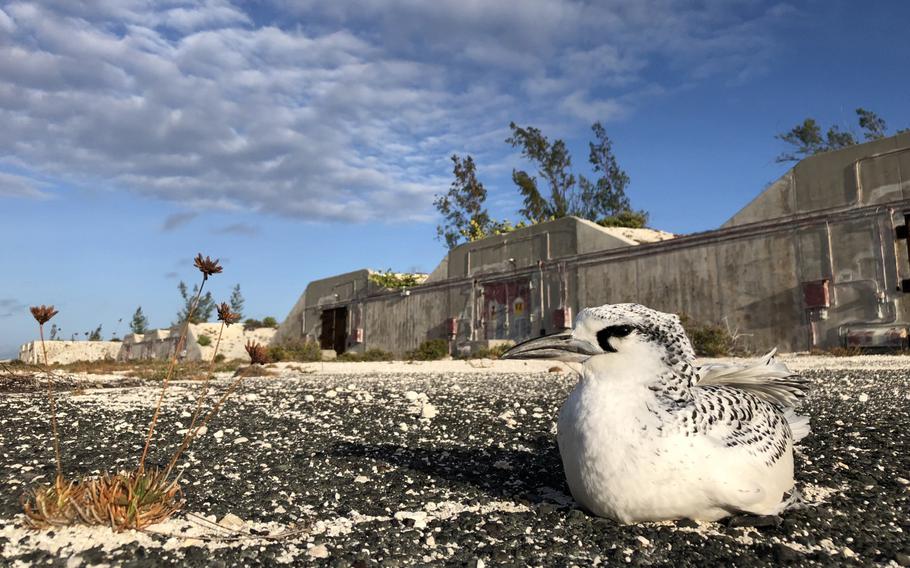
A red-tailed tropic bird sits beside abandoned buildings on Johnston Atoll in November 2021. (Eric Baker/U.S. Fish and Wildlife Service)
The Department of the Air Force has suspended plans to use an isolated Pacific island as a test site for landing rockets as it considers alternative sites.
The service had chosen Johnston Atoll, an unincorporated U.S. territory about 700 nautical miles southwest of Honolulu, for testing a program using rockets to rapidly deliver tons of cargo around the globe.
The Air Force had announced in the Federal Register in March that it was undertaking an environmental assessment for the construction of two rocket landing pads on the atoll.
It anticipated issuing a draft assessment by April, but publication was delayed as opposition to the plan by environmental groups surged. A petition calling for the Air Force to abandon the plan had garnered 3,884 signatures as of Wednesday.
“The Department of the Air Force has elected to hold the preparation of the Johnston Atoll Environmental Assessment for a proposed rocket cargo landing demonstration on Johnston Atoll in abeyance while the service explores alternative options for implementation of the rocket cargo Vanguard program at a location other than Johnston Atoll,” Laurel Falls, an Air Force spokeswoman, said in an email statement Wednesday.
“A notification will be published via Federal Register if the DAF decides to restart the action or ultimately cancel the Environmental Assessment,” she said.
Falls was unable to provide a reason for the expanded site search during a phone interview Wednesday.
The environmental assessment would have evaluated the impact of construction and operation of two landing pads at Johnston Atoll for up to 10 re-entry landings per year over four consecutive years.
“Current military modes of transportation require days to weeks of planning and logistics to provide materiel to distant locations at the time and place of need,” the Air Force said in explaining the need for the rocket program in the Federal Register notice.
The rocket cargo program would use commercial rockets, such as those made by Elon Musk’s Space X, although the Air Force has not announced industry partners.
The Air Force had also considered building the landing pads on Kwajalein Atoll, Midway Island and Wake Island, all of which have ongoing operations by the U.S. military.
Johnston Atoll has also had a long history of military operations — and extensive contamination as a result.
In the 1950s and 1960s, it was used for numerous missile launches during nuclear weapons testing. Launch failures during several of those tests led to plutonium contamination on the atoll.
The Pacific Islands Heritage Coalition, which launched the change.org petition, said in a March 13 news release that building the launch pads on Johnston “only continues decades of harm and abuse to a place that is culturally and biologically tied to us as Pacific people.”
The petition states that under control of U.S. armed forces the atoll “has endured the destructive practices of dredging, atmospheric nuclear testing, and stockpiling and incineration of toxic chemical munitions. The area needs to heal, but instead, the military is choosing to cause more irreversible harm.”